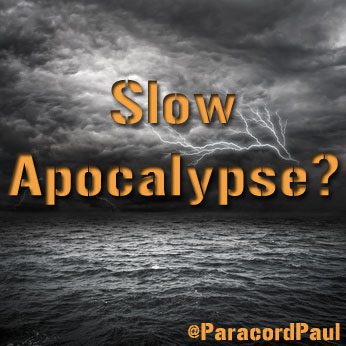Varley’s “Slow Apocalypse” Is a Scary Lesson in Family Preparedness

Every day you wake up, hear the latest news and can’t help but shake your head. If you are like us, you also have to wonder what kind of world we will live in next month, in a year, in a decade. Are we living in a “slow apocalypse”?
Generally, I don’t endorse works of fiction here. Still, I will make an exception and recommend the end-of-the-world page-turner Slow Apocalypse (Penguin Books, 2012) by Nebula and Hugo Award-winning science fiction author John Varley. Slow Apocalypse is fiction, all right. But the reader can immediately connect with its contemporary setting and how easily our comfortable lives could fall apart.
End of Civilization?
What could be the end of modern civilization arrives slowly as the world’s oil supply turns to useless, lumpy sludge, and oil fields everywhere begin exploding. It’s all human-caused, and its ramifications go from ominous to chaos as panic and shortages show how cooperation and interdependence in our society are fragile. (Think about what is happening in Ukraine and the Middle East today.)
The main character, a Hollywood comedy writer named Dave Marshall, gets a heads-up from a retired black ops marine — who, during the book’s prologue, is murdered by mysterious “blacker” ops SWAT troopers, apparently for knowing too much. We find out later just how much the old marine knew and how fortunate Marshall believed him.
Be Prepared
Unemployed and going broke, Marshall maxes out his credit cards and buys up as much survival food as he can fit into his basement. He jeopardizes his marriage as his spoiled wife cannot adapt to their reduced financial circumstances and believes that old Dave has become a survivalist nutcase.
Thus begins a saga and — a macro lesson — in the importance of family preparedness. Everything — power, transportation, food distribution, public safety — fails and falls apart. Dave reads everything he can to prepare for the upcoming fall, but his planning is less than perfect. Later he regrets not buying bulk-dried foods like rice and beans and concentrating too much on canned goods. Hindsight during an apocalypse is not 20-20; it just has to go without.
The reader never gets the big picture of the worldwide disaster since the story is focused on Dave’s world of family and professional colleagues. What news of the outside world there is comes filtered through government censorship and propaganda. Sound familiar? As the crisis spreads, the prospects for relief by the federal government facing a nationwide catastrophe become nonexistent as communications and our political system collapse. Yep…
Government’s Role
At the outset, government officials are more concerned with hiding the news of oil field destruction in the Middle East and the Asian oil fields. They have no solution and just try to keep the problem quiet. That is until the oil fields in the United States begin exploding. The Los Angeles City Oil Field goes up and takes out city blocks, and it gets worse. You can easily correlate this story to the issues DC is not being forthright about right now.
The oil seepage into the fault lines provides just the tectonic lubrication for a massive earthquake that takes everything down, including rescue and police. Law enforcement quickly becomes a matter of isolating the lawlessness and discouraging desertions among their own, who have their families to look out for. That’s a pretty accurate portrayal of what will happen.
Varley’s tale provides a modern context of the Second Amendment, especially the first words: “A well regulated militia, being necessary to the security of a free state…” Dave Marshall’s Hollywood Hills community bans together and forms a militia as marauding gangs prey on a helpless populace. The problem is that their militia is not as well regulated as necessary.
No Security
But things are far from secure, especially when Marshall’s neighbors begin to run out of food, and he believes it is time to move. His decision is accelerated as yet another natural disaster, a catastrophic brush fire, forces everyone out of the safety of the hills. When it rains, it pours, right? Plan on it. The rest of the story is about Marshall and his family struggling to find safety and do what they must to survive.
After reading Varley’s saga of family preparedness, the reader will quickly see why our Founders wrote in the last part of the Second Amendment, “…the right of the people to keep and bear arms, shall not be infringed.” As it turns out, when the Apocalypse comes, the people whose rights are most infringed upon are the ones without guns.
The story and lessons learned in the book hit home no matter what the apocalyptic catalyst is… The fact is we are living in fragile times. If you haven’t thought about “prepping” yet, I have an entire library of preparedness articles to get you started. No time like the present!
